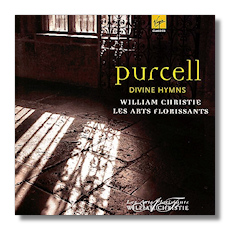
The Internet's Premier Classical Music Source
Related Links
-
Blow Reviews
Croft Reviews
Purcell Reviews - Latest Reviews
- More Reviews
-
By Composer
-
Collections
DVD & Blu-ray
Books
Concert Reviews
Articles/Interviews
Software
Audio
Search Amazon
Recommended Links
Site News
 CD Review
CD Review
Divine Hymns

- Henry Purcell:
- Jehova, quam multi sunt hostes mei
- Lord, what is man
- Hosanna to the highest
- Tell me, some pitying angel (The Blessed Virgin's Expostulation)
- Since God so tender a regard
- Funeral Sentences:
- In the midst of life we are in death
- Thou know'st, Lord, the secrets of our hearts
- all ye people, clap your hands
- In guilty night
- The night is come
- Close thine eyes and sleep secure
- Now that the Sun hath veil'd his light
- John Blow:
- Peaceful is he, and most secure
- Salvator mundi
- Pelham Humfrey:
- Lord! I have sinned
- Wilt thou forgive that sin
- William Croft: What art thou?
Paul Agnew, tenor
Thomas Michael Allen, countertenor
Claire Debono, soprano
Hannah Morrison, soprano
Konstantin Wolff, bass
Elizabeth Kenny, theorbo
Anne-Marie Lasla, viola da gamba
William Christie, harpsichord & organ
Les Arts Florissants/William Christie
Virgin Classics 5-95144-2 DDD 72:02
The title "Divine Hymns" might seem like Virgin's fanciful construction, but that's how Purcell himself described Lord, what is man. Recently, I reviewed a CD on the Atma label (Rise, O My Soul) that presented a number of anthems written for the Chapel Royal by various composers, including John Blow. For the most part, these were intended to be sung at church services, and represent the more public aspect of English sacred music from the second half of the1600s. The music on this CD was written for private devotions, such as in a family chapel – including if the chapel was Catholic and not Anglican. Blow's Salvator mundi is a good example of a work probably composed for use within the context of Catholic devotions.
Private devotions usually mean fewer performers, so the choir of Rise, O My Soul here is replaced with a handful of singers, and in the case of seven of these works, just one singer. Accompaniments are simple too; instead of a consort, there are just one or two instrumentalists. The effect is very intimate. That is not to say that there is no drama, however. Purcell's In guilty night (also known as "Saul and the Witch of Endor") treats the text as a sort of operatic duet, and The Blessed Virgin's Expostulation is like a small quasi-operatic scena for soprano, or at least a chamber cantata.
Soprano Claire Debono throws herself into that last task, yelping out Mary's cries of "Gabriel!" most pitifully. (Personally, I prefer a less overtly histrionic performance, such as the one by Sylvia McNair on her Philips disc of music by Purcell.) Christie tends to give a French accent to his performances of Baroque music, no matter which country it was composed in, and even when his singers are British, as two of them are here. (Claire Debono is Maltese, Thomas Michael Allen is American, and Konstantin Wolff is German.) Such is the case on this CD (and such was the case on the Atma CD too). He's not really unidiomatic… he just makes you think about Marc-Antoine Charpentier at unexpected moments. The singers treat the music respectfully, and apart from the exception noted above (and also Paul Agnew in Lord, what is man) do not emote very much.
This isn't a particularly lively disc. Some of the sentiments expressed by the singers include "Sleep is a death, O let me try,/By sleeping, how it is to die," and "Teach but my heart and eyes to melt away,/And then one drop of balsam will suffice." Contrast is provided by O, all ye people, clap your hands and Croft's "Hymn on Divine Musick," but mostly, this is a program of music using texts preoccupied with guilt, supplication, and regret. Christie does a nice job of pointing out thematic affinities, however. The latter part of the CD deals with the subject of night, sleep, and sleep-like death. This program has been both assembled and performed with a great deal of care.
The recording doesn't over-emphasize the intimacy of the music; it was recorded in the Eglise Evangélique Allemande in Paris, so there is some life to the recorded sound. The booklet contains a good essay, and the sung texts with translations. Recommended.
Copyright © 2008, Raymond Tuttle




















